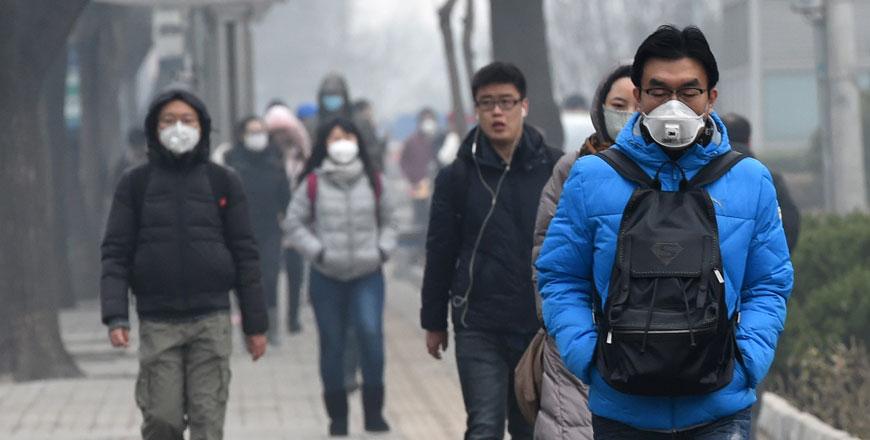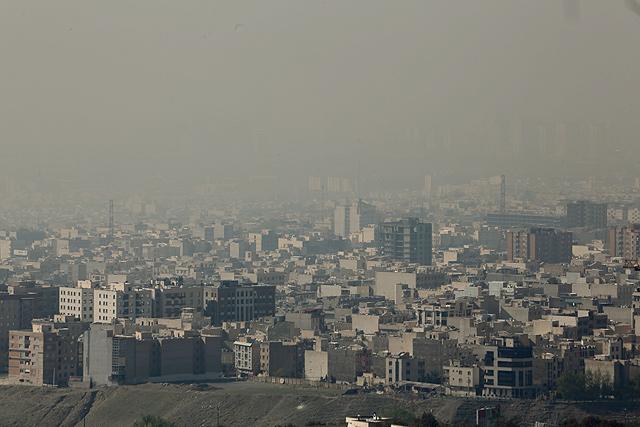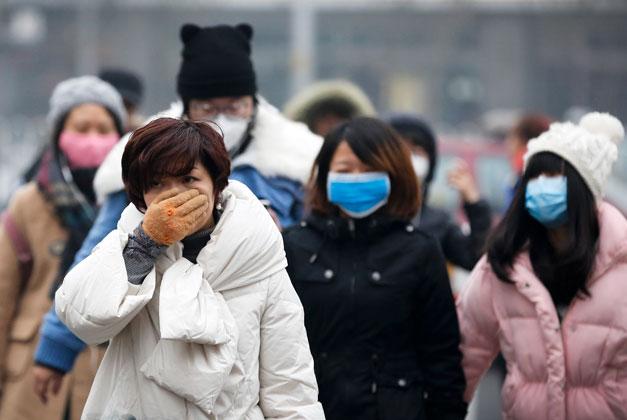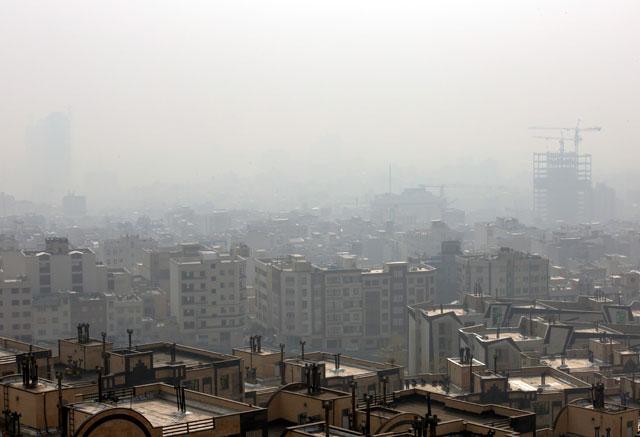You are here
Beijing slashes traffic in pollution red alert
By AFP - Dec 08,2015 - Last updated at Dec 08,2015

Chinese pedestrians walk along a street near the Chinese Central Television building on a heavily polluted day in Beijing on Tuesday (AFP photo)
BEIJING — Half of Beijing's private cars were ordered off the streets Tuesday and many construction sites and schools closed after authorities in China's smog-shrouded capital responded to scathing public criticism with their first-ever red alert for pollution.
A grey haze hung over the city of around 21.5 million people, with levels of PM2.5 — harmful microscopic particles that penetrate deep into the lungs — reaching 350 microgrammes per cubic metre according to the US embassy, which issues independent readings.
The World Health Organisation's recommended maximum exposure is 25.
The alert coincided with global climate change talks in Paris, where China is in the spotlight as the world's biggest polluter.
Most of the country's greenhouse gas emissions come from the burning of coal for electricity and heating — particularly bad when demand peaks in winter — and is also the main cause of smog, which can include multiple pollutants.
It was the first time Beijing authorities declared a "red alert" since emergency air pollution plans were introduced two years ago, although levels were far from the city's worst.
Last week it was enveloped in a toxic soup, cutting visibility severely and sending PM 2.5 levels as high as 634 microgrammes per cubic metre.
Under the alert — the highest in a four-tiered, colour-coded warning system — an odd-even number plate system bans half the city's roughly 4.4 million private vehicles from the streets on alternate days.
Outdoor construction work is barred and some industrial plants were told to cease or reduce operations, with some schools also urged to close.
The measures, while welcomed by many, created difficulties for working parents who had nowhere to send their children.
"Some parents still brought their children this morning, hoping that the teachers could at least mind them, but they had no choice but to leave them at home alone," Li Jianguo, a primary school caretaker, told AFP.
The school would be closed all week, he added.
In contrast, in India's New Delhi — the world's most polluted capital — government schools remained open, although some international schools stopped pupils going outside.
That city has no pollution alert system but has been suffering from weeks of choking smog, with PM 2.5 levels reaching 377 on Tuesday according to US embassy measurements.
Heavy smog also hit other parts of China, with state news service Xinhua blaming it for a 33-car pileup in the northern province of Shanxi, which killed six people.
On its social media feed, Beijing's environmental protection bureau posted a steady stream of comments in an attempt to demonstrate that its inspectors were working hard to ensure clean air.
Administrators said they were "dealing with" businesses that had violated the orders and had disciplined several factories, in one case with a 30,000 yuan ($4,700) fine.
One bus manufacturer, they wrote, had reduced production from 30 vehicles a day to around six.
'Poison gas'
Beijing's stepped up response came after city authorities were heavily criticised for only issuing an orange alert for last week's pollution.
"The red alert is a welcome sign of a different attitude from the Beijing government," said Dong Liansai, climate and energy campaigner for environmental group Greenpeace.
"However, this, the latest of a series of airpocalypses to hit Beijing, is also a firm reminder of just how much more needs to be done to ensure safe air for all."
Some social media commenters said the moves were not enough.
"Can we apply to work at home? The air in our office is totally 'poison gas'," said one poster on Sina Weibo, a Chinese version of Twitter.
The decision to issue the red alert despite relatively low pollution numbers also provoked ridicule.
"Today wasn't as serious as the previous time," said one user. "How could they not issue a red alert then and issue a red alert now?"
Despite the warning, Beijing's streets remained busy as people went about their routines, with only a few donning masks to protect against the foul air.
Traffic, however, appeared lighter than usual.
Engineer Wang Shaoang drives an electric car, which are not subject to the odd-even rule, an attempt by the government to promote the use of cleaner vehicles.
The measures imposed for the alert were good, he said, "but we need much more radical moves than this".
Related Articles
TEHRAN — Air pollution forced the closure of schools and universities in parts of Iran on Saturday, including Tehran, which was cloaked by a
BEIJING — Seeking treatment for respiratory illnesses, Beijing hospital-goers complained Wednesday that their conditions were being worsened
TEHRAN — Air pollution forced schools to close on Sunday in parts of Iran including Tehran, as the capital lay under a thick cloud of smog c


















